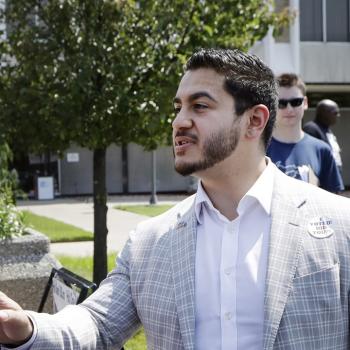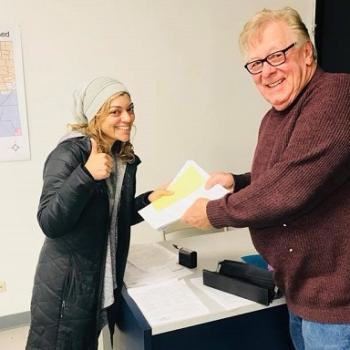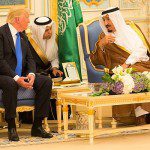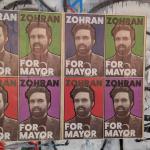 |
|
The flying Scotsman
|
With the increasing influence of nationalist parties in Europe (such as Britain’s BNP and the Dutch PVV party) and their subsequent demonizing of Muslim communities, you might find it surprising that a Muslim would run for British Parliament as a candidate for a self-described nationalist party. But the Scottish National Party (SNP) is no ordinary nationalist party and its candidate for British Parliament from Glasgow, Osama Saeed, is no ordinary Muslim. Though under 30, he is already an experienced activist, an award-winning blogger, and chief executive of the Scottish-Islamic Foundation. Saeed became attracted to the SNP when it opposed British involvement in the Iraq war in 2003 and soon found himself under the wing of Scotland’s First Minister Alex Salmond. Though he was a failed SNP candidate in 2005, the turmoil of Britain’s expenses scandal and recent successes of SNP candidacies in European Parliament elections in early June both mean that Saeed has a very good chance of winning his seat at the next general election, to be held before June 2010. Here, Saeed speaks with us about his impending candidacy, Scotland’s model of multiculturalism, and why Muslims in Scotland should continue to find comfort in a nationalist political party.
![]() For those readers outside the UK who may have heard of the British National Party (BNP), with its anti-Muslim reputation, when they hear that a Muslim is running for the Scottish National Party (SNP) in British parliamentary elections, it might raise some eyebrows. Tell us why it’s different. Why is the SNP something that Muslims could gravitate to as you’ve done?
For those readers outside the UK who may have heard of the British National Party (BNP), with its anti-Muslim reputation, when they hear that a Muslim is running for the Scottish National Party (SNP) in British parliamentary elections, it might raise some eyebrows. Tell us why it’s different. Why is the SNP something that Muslims could gravitate to as you’ve done?
Osama Saeed: It’s an issue that has caused a lot of confusion over the years, even within Scotland. When the SNP was first exposed to the Muslim community and ethnic minorities in general, members of the opposition Labour Party would put it around that the SNP is the BNP and effectively were the northern branch of that.
But it’s quite different. What the party advocates is a civic form of nationalism. It’s a very inclusive identity of Scotland. Effectively, our view is that if you feel Scottish, you are Scottish. There isn’t an ethnic identity to it. Over the centuries, there have been different forms of immigration to the country. And that has strengthened us and continues to strengthen us as we move forward as well.
In a nutshell, it’s a very different form of nationalism, which is to look out for the Scottish national interest. We’re a country that has been ruled from London and the tide is turning on that. There’s been an appetite over the last few decades for increasing powers and decision-making to be done in the Scottish national interest, because we are a sovereign nation – that’s the party’s view.
We had a Scottish parliament established in 1999, giving us power over substantial areas of policy, from education and health, crime, large areas of transport. And there’s a further debate now on increasing those powers to also include taking charge of our oil revenues, foreign policy, macroeconomic policy with the current economic crisis, and being able to tackle that as a country as well.
That’s what the SNP is about. Anyone who agrees with that is welcome. It’s not about excluding people or saying that one type of person is superior to another type of person. That’s really not on the agenda at all.
![]() Building on what you just said, the SNP won a by-election in Glasgow East, which was a Labour stronghold, last year. And in the expense scandal, the Speaker of the Commons, Michael Martin – also from Labour – was forced out. His constituency was Glasgow Northeast…
Building on what you just said, the SNP won a by-election in Glasgow East, which was a Labour stronghold, last year. And in the expense scandal, the Speaker of the Commons, Michael Martin – also from Labour – was forced out. His constituency was Glasgow Northeast…
That’s right.
![]() …Will the expense scandal help you and help the SNP?
…Will the expense scandal help you and help the SNP?
It’s hard to know. At the moment, obviously, the big parties have been hit badly, particularly Labour. The whole thing has been associated with them, rightly or wrongly. That’s the way people are seeing it. We won the European elections a couple of weeks ago resoundingly, the first time we’ve done that in a UK-wide election. In the constituency I’m standing in, we were neck and neck with Labour which is extraordinary in one of the heartlands, but typifies how our trajectory is upwards while they are plummeting.
Westminster, up here, has been really damaged by this and a number of other scandals, going back to Iraq, which is why I joined the SNP back in 2003. It was the spur for it, which was that we wanted a different kind of politics. And that is best done by making decisions closer to home.
I think the atmosphere in the Scottish Parliament is completely different from London, whether that is to do with issues of multiculturalism, as we were discussing earlier, or this sort of view of Scotland and the world is completely different than the way that London sees itself and the world, with all its imperial history and, I would say, a lot of feelings of superiority towards much of the world. It’s a very different culture to what we see in Scotland. This is just another facet of that, and the increasing desire for more power to come back to Scotland.
![]() You’ll be running for the seat vacated by Mohammed Sarwar, who was Britain’s first Muslim MP – and he was from the Labour party. Sarwar’s son is planning to run for his seat in the next election, which means you’ll have two Muslim candidates running for the same seat in a constituency which is about 10% Muslim. How is that dynamic going to play out in the election, or will it not make a difference?
You’ll be running for the seat vacated by Mohammed Sarwar, who was Britain’s first Muslim MP – and he was from the Labour party. Sarwar’s son is planning to run for his seat in the next election, which means you’ll have two Muslim candidates running for the same seat in a constituency which is about 10% Muslim. How is that dynamic going to play out in the election, or will it not make a difference?
Well, by London terms, it’s quite a low number, but it has the highest population of Muslims of any constituency in Scotland. I think the effect that it has is that it parks the whole identity issue. I think that when there’s a white non-Muslim up against a Muslim, it becomes almost like we have to talk about representation.
What this means is that whatever happens after the next general election, there will be a younger Muslim who will be the MP for that seat. And really it means we can get on to discussing the things that are important to people and Muslims as well, which is to do with the future of our country, the economy, and not get sidetracked by a lot of this.
I take the view that it’s not helpful to describe ourselves as Muslim MPs. I’m not going in to be a Muslim MP. Sure, I may be an MP that happens to be Muslim, but ultimately you’re elected to represent all of your constituents. And you’re also elected on a party ticket, and that’s what matters. My view on my opponent in the constituency is that he wouldn’t be as good, simply because he represents a party which is beholden to interests in London, rather than being able to stand up forcefully for Glasgow and for Scotland.
![]() What would you say to those who have suspicions in general about Muslims in politics, whether they fear an influx of “political Islam” or whether they feel they get a disproportionate amount of attention because of their faith?
What would you say to those who have suspicions in general about Muslims in politics, whether they fear an influx of “political Islam” or whether they feel they get a disproportionate amount of attention because of their faith?
Sure. I think in times gone by – and with the greatest respect to some of the previous amongst the Muslim community that have gone into politics, there was an element of tokenism about it. They weren’t necessarily better than other possible candidates. They were there because they were from a particular minority and there was a feeling that there needed to be broader representation.
I don’t think that’s the case anymore. I don’t want to blow my own trumpet, but I think I’m in there because I’m a capable person and the party selected me on the basis that I would be a good candidate and a good parliamentarian. We were talking about some of the Muslims in parliament at the moment, people like Sadiq Khan, who are clearly good at their job. Ok, they happen to be Muslim, and it may well be an important part of their life in terms of their belief system, but they have to do a job and they do it very well.
So I think that’s changing. But at the same time, there’s also harping on at some of the conspiracy theorists who want to ascribe some sort of sinister motives to Muslims who are involved in politics. I don’t think that’s a particularly influential stream of thought. It’s confined to kooks and that on the Internet, but I don’t think it plays an influential role in the real world.
![]() You’re fairly young for a parliamentary candidate, aren’t you?
You’re fairly young for a parliamentary candidate, aren’t you?
Yeah, I’m 29
![]() Would that make you the youngest candidate for the SNP or for Parliament as a whole?
Would that make you the youngest candidate for the SNP or for Parliament as a whole?
I don’t know. (Laughs) We do have a lot of young candidates. I was the youngest candidate at the last general election in 2005. If I was elected now, I’d be the youngest parliamentarian in the House of Commons. But I think that would also be the case for my opponent as well, who’s actually younger than me. So, yeah, we’ve got a particularly young ticket up here!
![]() Looking back at some of the issues raised by you that have stirred some controversy in the past, could you clarify two of them – namely support for state-funded Muslim schools and advocacy of a Caliphate [from an opinion piece in the Times of London in 2005]?
Looking back at some of the issues raised by you that have stirred some controversy in the past, could you clarify two of them – namely support for state-funded Muslim schools and advocacy of a Caliphate [from an opinion piece in the Times of London in 2005]?
In short, on Muslim schools or Islamic schools, there’s a well defined principle in the Scottish educational system supporting denominational education, with Catholic schools, Jewish schools, we’ve got specialist schools dealing with the Gaelic language, sports academies. These have sprung up whenever there’s been a demand for them to happen.
I think people from across the political spectrum… in fact, I’m failing to think of a mainstream political party up here that opposes that principle for the Muslim community as well. If there is a demand, then it should be set up. And that’s really all that’s been said about it. It’s not anything more complicated than that.
With respect to the Caliphate, in all honesty, it’s something that I addressed as a topic once in my life, and that was back in 2005. It was a direct response to something that Tony Blair had said at the time. It’s not something that I’ve expended any energy on apart from that one article. It’s not something I campaigned for and I think there’s a complicated discussion on what it would entail.
All that I was saying was the Caliphate can be consistent with democratic norms and human rights norms. I think to say the opposite of that is effectively saying that Islam is problematic and not compatible with these things. I also think it’s complicated internationally. I’m not advocating that we need one big superstate, because there are territorial integrities to take into account.
But if Muslim countries decided that they wanted creative cooperation, bring down trade barriers in the same way that Europeans do within the EU and the United States does [internally], that’s a laudable aim. I don’t see that there’s anything wrong with that. You’ve effectively got a significant international structure there. It’s just about talking about in modern terms.
I think we’ve also got to say that for the world to move forward, then there has to be some sort of aspiration for that sort of vision which I don’t think anyone’s really giving at all. I’ve been interested in things Barack Obama has said and we’ll see where that kind of dialogue takes us. But for the first time, someone’s actually talking about the Muslim world and how the West can relate to it other than just getting oil out of it. The first step though has to be democratic reform within Muslim countries, and better education empowering the people.
![]() With regards to the situations of Muslims elsewhere in Europe, do you see a model forming around the Scottish experience that Muslims in other European countries can learn from?
With regards to the situations of Muslims elsewhere in Europe, do you see a model forming around the Scottish experience that Muslims in other European countries can learn from?
I think there is definitely something to that. I’ve been arguing that we need to look at our responsibility to talk about that far more. I’ve had the opportunity over the last year or so to travel pretty extensively across Europe and the United States. And in my opinion, I don’t think there’s a better place in the world to be a Muslim than in Scotland.
I was somewhat surprised with the US… I expected the situation in America to be pretty bad. I actually found that people are very comfortable with their identity and very positive about it, in fact.
Whereas across Europe… I was part of a 20-strong delegation, a State Department visit to America last year with young Muslim leaders drawn from across Europe. And the Scottish contingent, it’s fair to say, were the only ones that identified themselves with the country of birth, whereas everyone else sees themselves as Turkish or Pakistani or wherever else. I think it’s something we take for granted here.
The research done by Stirling and St. Andrews universities, which found that young Muslims in Scotland had a higher degree of nationalism and Scottish national identity than the overall population… again, it’s something we take for granted. We’re, I would say, the only country in Europe that has a government that has a slogan like “One Scotland, many cultures,” very explicitly embracing that idea of multiculturalism. And across the political spectrum, there’s acceptance of that, even the Conservative Party would take a pretty harsh line on this in London.
They don’t do that in Scotland. The media situation with the tabloids is a lot calmer here. And the result of that has been that there’s less of a defensiveness amongst Muslims in Scotland. It’s meant that people can just get on with their lives and just be normal. When you find your statistics and people identifying themselves as Scottish, that’s just what normal people do. The minute you start focusing in on it as happens in many other countries, then you start creating the very problems that you claim to be trying to eliminate.
So, yeah, I’d be very interested in engaging in that discussion far more on a national level and I think Scotland has a pretty prominent part to play in that discussion.
Zahed Amanullah is associate editor of altmuslim.com. He is based in London, England.











